This post has already been read 3929 times!

I’ve mentioned the importance of demonstrating Executive Presence to climb the corporate ladder before in numerous posts. The requirement of demonstrating self-confidence is important for this.
It’s also important for Emotional Intelligence, a required set of traits that enhances your presence in the right manner.
Low Confidence is akin to the cat catching your tongue
Sometime back a young lady professional told me about her problem of not finding her voice in Group Meetings.
She had some great ideas that could help improve team performance and client management. She prepared for these meetings. Yet, once in the meeting, she found herself keeping quiet while more assertive colleagues stole the show.
What made it worse was that she knew many of her colleagues’ ideas would not be viable.
It isn’t unusual that colleagues who are active in conversations get noticed. They create an impact, get recognition and with it, career opportunities.
Keeping quiet is not the solution if you want to get ahead in your career.
Yet she keeps quiet.
It’s this lack of confidence to speak up which is clearly holding her back and moving ahead in her career.
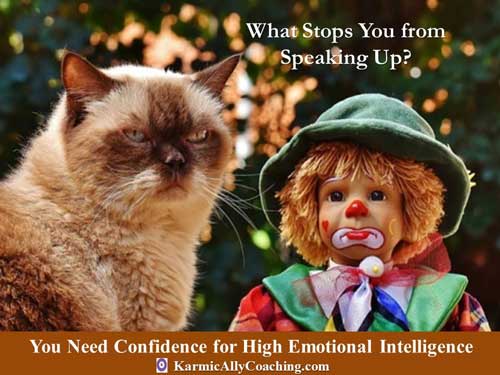
Does this scenario sound familiar to you?
It certainly does to me but not from my corporate world experience. I learned my lesson back when I was a young girl in a residential school.
I had good ideas too but unlike my classmates, I wouldn’t speak unless the teacher asked me for my view.
No wonder when our class’s turn came to be Captains and Leaders, I was nowhere in the running to get a badge with position and prestige.
It wasn’t until I was leaving school that one of my teachers told me that she knew I had what it took to be successful. I was told to raise my visibility and demonstrate more confidence.
I took note of her parting advice and the rest, as they say, is history.
Self-confidence is an important facet of Emotional Intelligence
Think about the people you admire the most.
More often than not, you’ll notice they are of pleasant disposition, down to earth and have healthy self-esteem. In common lingo, one could say they “have their act together.”
Research affirms the importance of self-confidence for career success, job satisfaction, career status, and salary.
According to the book, ‘The Confidence Code,’ confidence is more predictive of career success than competence!
That doesn’t surprise me because professionals with healthy self-confidence have a more optimistic and positive view of the world and are more likely to be willing to step out of their comfort zone to rise above challenges, stay focused on their goals because they believe they can achieve whatever they set out to.
For them, a challenge is a learning opportunity that will enable them to sharpen their skills that in turn will make them viable candidates for more opportunities.
Moreover, they choose occupations that support their interests leading to greater job satisfaction.
Arrogance is not a sign of Confidence
While low self-confidence can lead to lost opportunities, there is another problem with confidence – over confidence or arrogance.
Overconfidence or pseudo-confidence is destructive. Domineering behaviour might work at the lower rungs of the corporate ladder, if at all but the higher you go up, the more your people skills begin to matter.
How your team members and peers perceive you is as important as the boss’s perception of you.
But if we are to develop high Emotional Intelligence or Emotional Quotient and become successful, this is exactly what we must do!
Confidence and Personal Competencies of Emotional Intelligence
In my post on the skill of empathy and emotional intelligence, I refer to the personal competency of Self Awareness demonstrated by emotionally intelligent people.
Competency in this domain requires mastery of emotion and a healthy self-perception is vital.
Self-perception allows you to recognize a feeling while it happens. The key competencies under self-perception are self-awareness and having self-confidence.
I go into greater detail with exercises in my course Emotional Intelligence – The Basics but for the purpose of this post, here is a slide from the Self Awareness Module of the course.
Being aware of one’s emotions and accurately reading them is a basic aspect of emotional intelligence and helps guide your decision-making process.
It underlies all other processing of emotional information. Your own emotions include areas of beliefs and core values, as well as preferences, goals, strengths, weaknesses, and intuition.
Self-confidence comes from an accurate sense of your worth and abilities. This leads to a belief in yourself and the ability to be a better decision maker.
I provide a full course on building one’s confidence in my book Self-Confidence in 8 Steps which will help you master it.
Do you have a confidence problem?
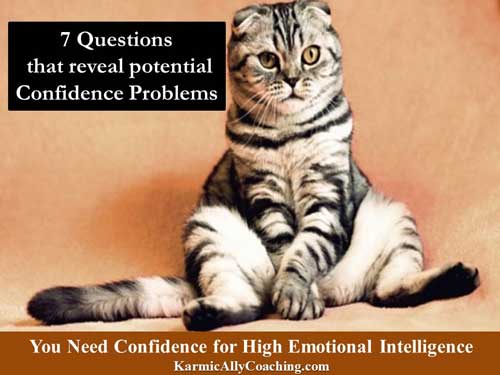
To determine if you have a confidence problem, think about your behavior in different situations and ask yourself:
In a conflict situation, are fingers pointed at me?
Do I frequently take a very strong stand on issues?
Am I the first to speak up with an opinion?
Do I often cut off further discussion in favour of my position?
Am I spending more time talking than I do listening?
Do I hold my stand to unreasonable lengths? Or do I cave in at the first sign of aggression from others?
Am I able to share my point of view?
Depending on your answer, you might be low on confidence or over confident which needs to be addressed.
A truly confident person knows how to balance their needs with those of other people. This leads to more success when it comes to social management.
One tip that I can give you to improve your confidence and score in emotional intelligence is to learn to accept your mistakes.
We all goof up at times and admitting that we are wrong can often stop a situation from escalating into a full blown crisis.
Remember, even people with high levels of confidence are apt to make mistakes. I mean, they are human, right?
But an emotionally intelligent person will not make it into a prestige issue sticking to their guns when they know they are in the wrong.
Instead, they understand that this is a learning opportunity to do things differently. They are not afraid to admit they got it wrong.
I remember the time when one of my mentors who is mentioned in my book Get Noticed! told me how a simple apology when we are in the wrong goes a long way to maintain goodwill.
How a simple sorry prevented a blame game war
The incident was a minor one with a clash between my department and the co-insurance one over the system crashing while we were moving into a new insurance and accounting interface software in our company.
The crash was caused by a fault in the program and really it was not our fault but that of the vendor who had over-promised on major software but was developing it as we went along.
An entire week’s worth of accounting and insurance information was lost and there was lots of arguing and blame throwing – not good for productivity.
I understood what my mentor boss was saying and went to the head of Co-insurance to apologize for my team’s outburst. I was surprised to receive an apology in return. Looks like the boss had counselled both of us!
After that we set up a disaster management plan and backups were taken on the hour instead of the routine twice a day.
That was an emotionally intelligent boss guiding his people to demonstrate the same competency that I want for you.
Does your confidence come in the way of being perceived as emotionally intelligent by others?
Additional Resources to Boost your Self Confidence and Emotional Intelligence
Here is a selection of resources that you will find useful on the topic of self confidence and emotional intelligence.
Emotional Intelligence – The Basics for Professional Success


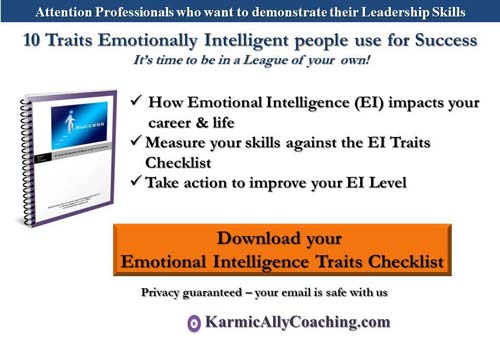
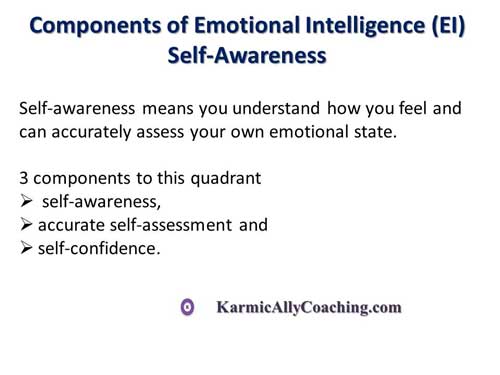
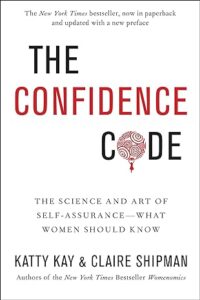
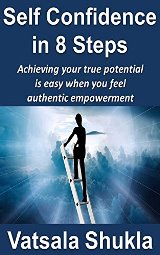


 I adhere to the Certified Coaches Alliance Code of Ethics and Standards. A copy is available on request.
I adhere to the Certified Coaches Alliance Code of Ethics and Standards. A copy is available on request.
 Let's Talk through the Connect Form:
Let's Talk through the Connect Form:
Learning to speak up can be a hard lesson, but it’s also one that’s needed. I believe it does help with our confidence level. Just like a strong hand shake gives a better impression than a weak hand shake, your voice can give a weak or strong impression as well. As an Introvert with the different jobs I have had during the years, I have learned to make myself speak up. What is so amazing, once you do begin speaking up it gets easier and easier to do. People even think I’m an Extrovert and are surprised to learn I’m an Introvert at heart because of how I speak up And guess what??? You can also still not speak up if need be….but at this point the choice is yours. Great info…
I agree with you Livvie. I’m actually, to some extent an introvert at heart too and take my time to really open up. I overcame it by finding my voice on topics that I am passionate about like, animal rights, human rights and elderly care.
Very well put. In the past I tended to be much more quiet. I didn’t always speak up when I had something to say. I do know that when it’s really important to speak out, to do so in love. As I got older I’ve found more of my voice however I still tend to have a shyness to me in certain ways. I guess that’s just part of who I am.
We do find our voice as we gain maturity over the years and lose many of our inhibitions, Heather Maria. As for the shyness, perhaps that is your unique endearing trait? Quite a few of us are shy by nature or as I call in my book, Self Confidence in 8 Steps, quasi-confident.
Our voice expresses our confidence in many way – verbal and non-verbal. This is an insightful article, and the questions to determine if one has a confidence issue are very helpful. Thanks for sharing your pearls of wisdom!
My pleasure Cindy. Thank you for adding your perspective to the conversation and enriching it.
I think finding and owing our voice is important in every area of our lives.
I agree, Barb. Knowing when we need to voice our view and when to play the observer is an art form in itself.
I really like the way you look at confidence as a spectrum. It can be so variable and situation-dependent. Thanks.
My pleasure Andrea!
Awesome write up.
Thank you for sharing on this so important subject.
Those confidence questions are very important.
I will reflect on them today
Thanks Leila. Asking ourselves questions about our confidence level on the spectrum from low to high often reveals hidden issues that need to be addressed.
Your posts are so content-rich that I have to save them to re-read and re-read. Interesting that I just took an online Emotional Intelligence Test by Psychology Today.
Your questions to consider if you have a confidence problem are ones I will revisit.
You’ve made my day, Lore. Thank you for the compliment! You’re always welcomed back to my blog with gratitude and sincere appreciation.